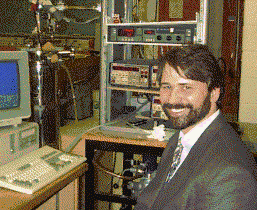
Ron Rogge visiting his old lab, 26.03.1996
|
Ron(ald) B. Rogge
B.Sc. (Honours) 1987 (Brock), M.Sc. 1990 (Brock), Ph.D. 1994 (McMaster)
|
As for many of Brock's alumni, the small size of Brock University always
held an appeal for me. Since my major was in Physics (a typically small
department in most Universities) the Physics Department proved to be
particularly small. The direct interaction with the professors that this
allows is rare in larger universities. More specifically, I inevitably
had some professors teaching me courses each and every year of my
undergraduate studies, which naturally resulted in them becoming
unofficial guardians of my scholastic career. In particular I am
indebted to Dr. B. Mitrovic for his support and encouragement throughout
my years at Brock.
I completed my Honours B.Sc. degree in 1987. My undergraduate research
project dealt with the interfacing of computers to experimental apparatus
for undergraduate lab courses. This was done at a time in which this
approach was not so prevalent as it has become today. The project has
proven invaluable to me and I continue to benefit from the basics I
learned under the supervision of Dr. J.A. Moore. I then remained at
Brock to pursue a Masters degree under the enthusiastic supervision of
Dr. F.S. Razavi, which I completed in 1990. Once again my project
involved a computer controlled experiment, but the considerably more
ambitious undertaking of developing a system for performing Specific
Heat Capacity measurements of small samples over an extended temperature
range. From this work I gained great deal of experience in the
art-of-experimentation: experience I may well not have had the luxury
to obtain at universities which aspire to higher throughputs of Masters
students.
In 1990 I entered the Ph.D. program in physics at McMaster University to
work with Dr. B.D. Gaulin. At McMaster my work centred around the
exploitation of neutron scattering techniques for the study of phase
transitions in condensed matter. One of the great advantages of these
experiments is that they require nuclear reactors and therefore it was
necessary for me travel to various world class facilities such as
Brookhaven National Laboratory, Oak Ridge National Laboratory and
Chalk River Laboratories. Here I was able to interact with top
scientists from around the world gaining yet more valuable experience.
My interactions with the staff at Chalk River Laboratories of AECL
Research have proven most fruitful as I received an offer for a
post-doctoral position over a year in advance of completing my Ph.D.
I am presently employed in this position which is with the ANDI
(Applied Neutron Diffraction for Industry) subgroup of the Neutron
and Condensed Matter Branch. The focus of this group is to utilize
the unique ability of neutrons to probe deeply into full scale
industrial components and perform a variety of typically non-destructive
measurements. Among these are strain and residual stress of such items
as train rails, the booster rocket casing of the Space Shuttle Columbia
and many internal components of nuclear reactors such as CANDU designs.
The group also specializes in such diverse applications as texture
measurements and in situ temperature profiles of moving parts. The
entire group is continuously developing new applications of neutron
scattering and presently my primary project involves developing the
technique and analysis for performing strain and residual stress
measurements very close to the material's surface, thus covering the
region between those for which X-rays are easily applied (below 0.1mm
from the surface) and neutrons are traditionally used (at depths
greater than 1mm).
On the personal side of life I have recently married (October of 1992)
and in December of 1993 my wife Denise gave birth to our baby Renee,
providing my step daughter Michelle with a little sister. I enjoy
various activities and have returned to teaching Alpine skiing on the
side after an hiatus during my graduate studies.
I very much enjoy my work at AECL and strongly feel that my training
in neutron scattering at McMaster was by no means the sole factor that
lead to my employment with the company. Rather I feel the experience
and encouragement to explore new ways to do things that I received at
Brock was also instrumental and continues to benefit my work everyday.
Despite the slings and arrows that many Brock graduates will tell you
they have to endure, I have always been and will always be, proud of
my Brock degrees and grateful for the training I received there.
Ron Rogge, 15-March-1994
National Research Council Canada
Steacie Institute for Molecular Sciences
Neutron Program for Materials Research
Chalk River Laboratories
Chalk River, Ontario
Canada K0J 1J0
Phone: (613) 584-3311, x3989
FAX: (613) 584-4040
E-mail: [email protected]
http://neutron.sims.nrc.ca/~rogger/
Ron Rogge successfully defended his Ph.D. thesis in September, 1994.
Dr. Rogge is with the NRC's Neutron Program for Materials Research.
Division of Condensed Matter Physics of the CAP awarded its 1996 prize for
the best paper on condensed matter physics to:
R.B. Rogge, B.D. Gaulin, E.C. Svensson, E.D. Hallman, and W. Wei
Neutron Scattering in Cu3Au: Evidence for a lower spinodal temperature
Can. J. Phys., 73:779, (1995)
|